ESPN has been a bit boring of late, as it has continued to broadcast heavily on the Penn State Scandal. NPR of November 17, 2011 reported Jerry Sandusky, former defensive coordinator for the Nittany Lions and head of The Second Mile – a children’s charity foundation for foster children – is accused of multiple accounts of sex crimes against young boys.
The moral reprehensive nature of Sandusky’s actions is all too easy to condemn. Even beyond Sandusky, the morality of Joe Paterno and peripheral figures remains debatable. Unfortunately, a key lesson in this mess is being missed: the flaws in how we typically conceptualize pedophiles.
When we think of pedophiles we think of unscrupulous monsters preying on young children at playgrounds. At the very least, we don’t think of decorated football players who lead a nationally renowned charity. More to the point, we don’t think of them as “good” people and this is precisely why the young boys molested were victims.
A CNN article from November 9, 2011 argues against the “myth of the monster pedophile.” The author argues by conceptualizing pedophiles as unknown attackers who lurk in the shadows, we aren’t actually protecting our children. After all, the article points out more than 90 percent of abused children know their attacker.
Pedophiles will often ally themselves with trusted organizations as a means of getting themselves trusted by children. After earning trust, the pedophile will begin to initiate physical contact.
A USA Today article from November 15, 2011 adds “ ‘I call them institutions of trust, says Portland, Ore., attorney Kelly Clark, who has represented more than 300 sex abuse victims. Some predators are so tacitly trusted that when something like this happens, the instinctive reaction is, ‘That can’t happen here. We can’t allow the mission to be compromised,’ he says.”
Unfortunately we’ve seen this narrative play over again and again: predator assumes the trust of the victim and then takes advantage of their position. Take into account two of the once most trusted institutions in the United States and worldwide: The Catholic Church and the Boy Scouts of America have been plagued by sexual abuse scandals. Obviously Penn State, one of college football’s cleanest programs, has fallen to this tragic trend.
Ultimately, it is only when we reframe how we view pedophiles can we begin to protect children. Clearly, by protecting children against “monster pedophiles,” we are protecting them against something that largely doesn’t exist. I am wholly cognizant that what I am advocating is much easier said – or written – than done.
It can begin by being almost rude in parent’s reluctance to allow, what the previously cited USA Today article notes as the beginning of the pedophiles preying,
eventual sexual abusers “unlimited access to their kids.” That’s not to say we cannot trust others, of course we can. It should go without saying, however, we should certainly err on the side of extreme caution, particularly when children’s’ livelihood and innocence is at stake.
The Penn State Scandal is deeply saddening for multiple reasons. First, because of the trauma young children unfortunately suffered. Second, there is the nagging feeling the public is more upset about the firing of Joe Paterno – loved as he may be – than the victimization of these children. Third, Penn State’s insistence, and the general uniformity of agreement, it is a completely trustworthy institution.
We should use the Penn State Scandal to learn doubt is always good in moderation. By, at some level, doubting the sanctity of our organizations and their members, we can protect our children from being preyed upon by them. If we had learned this lesson much earlier, “a Nittany Lion preying” wouldn’t carry such a terrible double entendre.









